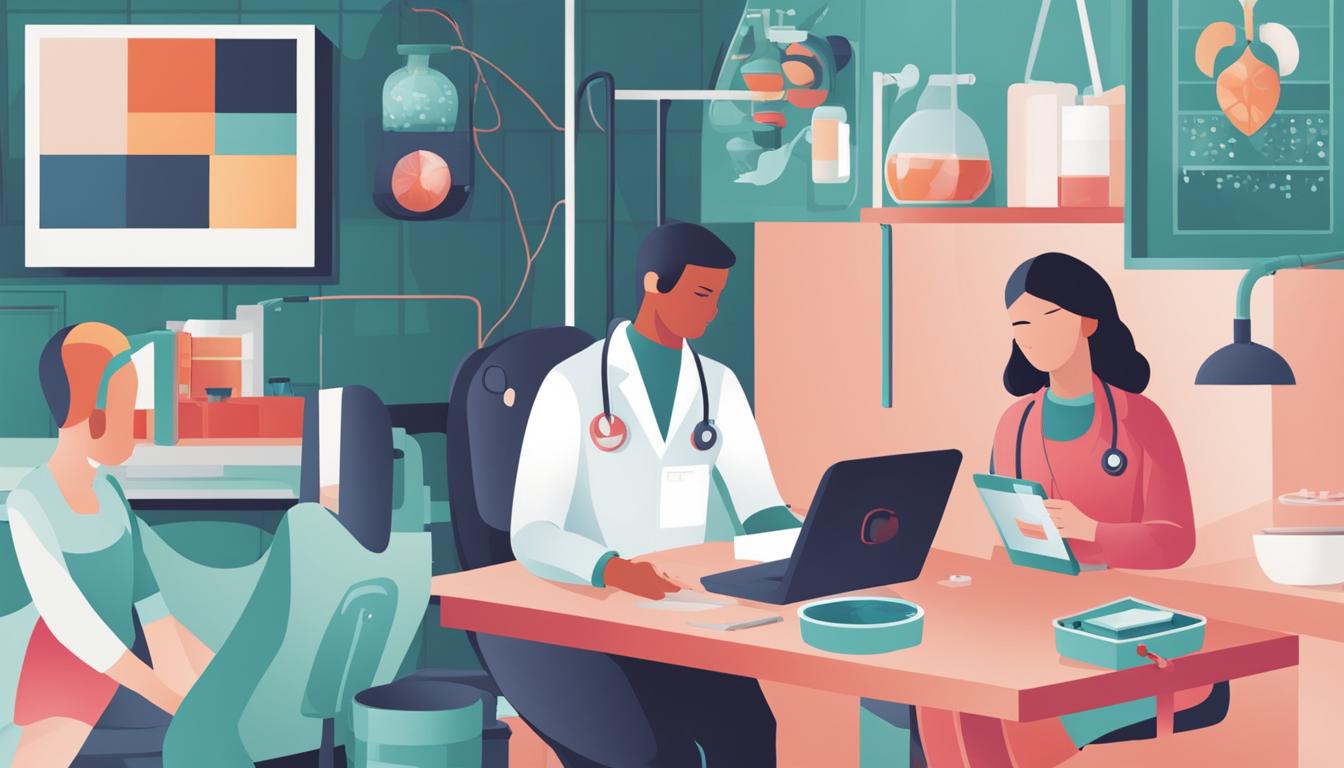Welcome to our article on the benefits of regular health check-ups! Medical exams and preventative healthcare play a crucial role in maintaining your overall well-being. From wellness screenings to regular health assessments, preventive care services offer a comprehensive evaluation of your health status.
Annual physical examinations, also known as preventive health check-ups, provide numerous advantages for individuals of all ages. They help in the early detection and treatment of chronic illnesses such as depression and hypertension. These check-ups also prioritize an increase in vaccinations and screenings for diseases like cancer, ensuring you stay protected against preventable illnesses.
Regular health check-ups not only address immediate concerns but also contribute to your long-term health and well-being. They provide a holistic approach to healthcare, focusing on proactive measures to improve your overall quality of life.
Key Takeaways:
- Regular health check-ups offer a comprehensive evaluation of your health status.
- They aid in the early detection and treatment of chronic illnesses.
- Preventive screenings and vaccinations are integral components of check-ups.
- They contribute to your long-term health and well-being.
- Regular check-ups prioritize proactive measures to improve your overall quality of life.
The Debate on Annual Health Check-Ups
Routine medical check-ups have long been a topic of debate in the healthcare industry. Some argue that they are a waste of time for patients and contribute to the already heavy workload of primary care physicians. However, recent evidence suggests that routine check-ups still hold important health benefits, particularly for at-risk populations.
A study conducted by Northwestern Medicine found that routine check-ups can lead to better detection and treatment of chronic diseases, such as depression and hypertension. Additionally, they can increase the likelihood of receiving vaccinations and screenings for diseases like cancer. While regular check-ups may not necessarily help adults live longer or prevent cardiovascular events, they still play a crucial role in improving overall health and well-being.
It is important to consider the perspective of overworked primary care physicians when discussing the value of routine check-ups. Primary care providers often face time constraints and a high volume of patients, making it challenging to provide comprehensive care during limited appointment times. However, finding ways to alleviate the burden on healthcare professionals and optimize the efficiency of check-up visits may help address these concerns.
The Surprising Benefits of Routine Check-Ups
Regular check-ups have been proven to offer a range of benefits that can contribute to better overall health and well-being. One of the significant advantages of routine check-ups is the detection and treatment of chronic diseases. By conducting regular screenings and assessments, healthcare professionals can identify potential health issues early on, allowing for prompt intervention and management. This proactive approach can significantly improve outcomes for individuals with conditions such as diabetes, hypertension, and cardiovascular diseases.
In addition to chronic disease detection, routine check-ups also play a crucial role in controlling risk factors. Through comprehensive evaluations, healthcare providers can assess lifestyle factors such as diet, exercise, and smoking habits. By identifying areas of concern, patients can receive guidance and support to make positive changes that can help mitigate future health risks. This emphasis on risk factor control is essential in preventing the development of serious illnesses and promoting long-term health.
Preventive screenings are another key benefit of routine check-ups. These screenings encompass a range of tests and examinations that can help identify potential health issues before they become more severe. Regular check-ups are an opportunity to receive vaccinations, screenings for conditions such as cancer, and other preventive services that contribute to overall well-being. By prioritizing preventive care, individuals can take proactive steps to maintain their health and address any underlying issues that may arise.
Regular check-ups are not just about treating existing conditions – they’re about preventing future problems. By staying proactive and catching health issues early, we can take control of our health and live our best lives.
The importance of routine check-ups cannot be overstated.
- Proven benefits include chronic disease detection, risk factor control, and preventive screenings.
- Early detection and treatment can lead to better outcomes and improved quality of life.
- Regular check-ups provide opportunities for open communication with healthcare providers, fostering a trusting and collaborative relationship.
Overall, routine check-ups offer numerous benefits that extend beyond simply addressing immediate health concerns. By prioritizing preventive care and early detection, individuals can take control of their health and well-being. Regular check-ups provide an opportunity for healthcare professionals to assess and guide patients in managing their health, resulting in improved outcomes and a healthier future.

The Importance of Preventive Care for At-Risk Populations
Regular check-ups are particularly vital for at-risk populations, including ethnic or racial minorities, those with uncontrolled risk factors such as diet, exercise, and smoking, individuals with low self-rated health, those without a single source of trusted care, and those living in areas with low access to primary care providers.
For ethnic or racial minorities, routine check-ups play a crucial role in addressing disparities in healthcare. These populations often face higher rates of chronic diseases and limited access to quality care. By regularly visiting healthcare providers, they can receive necessary screenings, medications, and lifestyle recommendations to manage their health effectively.
Individuals with uncontrolled risk factors, such as poor diet, sedentary lifestyle, and smoking, are at a higher risk of developing chronic conditions like heart disease and diabetes. Regular check-ups provide an opportunity to assess these risk factors and receive guidance on making healthier choices. Healthcare providers can offer support, education, and resources to help individuals improve their overall well-being.
Improving Health Outcomes and Access
Regular check-ups are especially important for individuals with low self-rated health. These individuals may have underlying health issues that have not been diagnosed or adequately managed. By seeking regular medical care, they can address these concerns early on, leading to improved health outcomes and a better quality of life.
Lastly, routine check-ups are essential for individuals living in geographic areas with low access to primary care providers. Limited access to healthcare facilities and specialists can be a significant barrier to receiving preventive care services. Regular check-ups help bridge this gap, ensuring that individuals in underserved areas have access to necessary screenings, vaccinations, and comprehensive healthcare.

Overcoming Barriers to Routine Check-Ups
When it comes to receiving routine check-ups, the cost should never be a hindrance. Medicare coverage ensures that every patient, especially insured patients 65 years and older, can get an annual wellness visit for $0 copay. By removing financial barriers, more individuals can access the benefits of regular health check-ups.
Regular check-ups play a vital role in preventive healthcare, allowing for the early detection and treatment of potential health issues. By addressing concerns proactively, individuals can avoid complications and receive timely and appropriate care. Preventive screenings, such as cancer screenings, are often included in routine check-ups, further contributing to overall health and wellbeing.
“Regular check-ups should not be limited by financial constraints. Medicare coverage ensures that every insured patient 65 years and older can get an annual wellness visit for $0 copay.”
For insured patients 65 years and older, routine check-ups are an essential part of comprehensive care. By establishing a consistent and trusted source of primary care, individuals can foster relationships with their healthcare providers, leading to open communication and a positive healthcare experience. With Medicare coverage in place, cost should never be a barrier to these important health visits.

Benefits of Overcoming Financial Barriers to Routine Check-Ups
- Increased accessibility to preventive healthcare services
- Early detection and treatment of potential health issues
- Improved overall health and wellbeing
- Enhanced patient-provider relationships and open communication
By overcoming the cost barrier, more individuals, especially insured patients 65 years and older, can access routine check-ups and reap the numerous health benefits they provide. It is crucial to prioritize preventive healthcare and comprehensive care for a healthier future.
Patient-Reported Outcomes and the Value of Routine Check-Ups
Routine check-ups not only have physical health benefits but also contribute to patient-reported outcomes. These outcomes, based on how the patient feels after the visit, play a crucial role in overall health and wellbeing. Patients often walk away from check-ups with a sense of improved health and may experience a self-fulfilling prophecy of better wellbeing.

Self-reported outcomes are significant because they reflect a patient’s perspective and provide valuable insight into their emotional and mental state. When patients report positive outcomes after routine check-ups, such as feeling more energized, less stressed, or experiencing a sense of control over their health, it can have a profound impact on their overall quality of life.
Furthermore, patient-reported outcomes can empower individuals to make positive lifestyle changes. For example, if a patient reports feeling motivated to exercise more, eat a healthier diet, or quit smoking after a check-up, they are more likely to take action and adopt healthier habits. These behavioral changes can have long-term benefits and contribute to improved health outcomes.
Key Takeaways:
- Routine check-ups contribute to patient-reported outcomes, reflecting a patient’s emotional and mental state.
- Positive outcomes reported by patients include feeling more energized, less stressed, and having a sense of control over their health.
- Self-reported outcomes can inspire individuals to make positive lifestyle changes, leading to improved health outcomes.
The Role of Primary Care in Routine Check-Ups
Establishing a trusted source of primary care is crucial when it comes to routine check-ups. Having a healthcare provider who knows your medical history and fosters a relationship with you can make all the difference in your overall healthcare experience. Open communication and the ability to discuss concerns openly contribute to a positive and productive check-up.
Primary care providers serve as a trusted source of care, guiding you through the various aspects of your health. They can help coordinate your preventive screenings and vaccinations, monitor your chronic conditions, and address any health concerns you may have. By having a primary care provider who knows your medical background and understands your individual healthcare needs, you can receive personalized care and tailored recommendations to improve your overall well-being.
“A primary care provider is like a partner in your healthcare journey. They are there to support you, answer your questions, and address your health concerns. Having a primary care provider who knows you and your medical history can contribute to a more effective and efficient check-up experience.” – Dr. Emily Johnson, Family Medicine Physician
By establishing a relationship with a primary care provider, you can build trust and confidence in your healthcare decisions. This trust allows for open communication about your health and any potential issues you may be facing. Whether it’s discussing new symptoms, managing chronic conditions, or seeking preventive care, a primary care provider plays a vital role in ensuring you receive the care you need.

Building Relationships for Better Health
When it comes to routine check-ups, having a primary care provider who serves as a trusted source of care is essential. The relationship you build with your healthcare provider allows for open communication, personalized care, and a more comprehensive approach to your health. By fostering this relationship, you can ensure that your routine check-ups are not only effective but also tailored to your unique needs.
The Benefits of Early Detection through Regular Check-Ups
Regular health check-ups play a crucial role in detecting health issues early, allowing for prompt treatment and minimizing the risk of complications. By being proactive about their health, individuals can avoid potential long-term consequences and ensure better outcomes.
During routine check-ups, healthcare providers can conduct various screenings and tests to identify any underlying health problems. Early detection of conditions such as cancer, diabetes, or heart disease allows for timely interventions, increasing the chances of successful treatment and recovery.
Furthermore, regular check-ups provide an opportunity for healthcare professionals to assess risk factors and provide necessary interventions. By identifying and addressing factors such as high blood pressure, high cholesterol, or obesity early on, individuals can adopt healthier lifestyles and reduce the likelihood of developing chronic diseases.
Overall, the benefits of early detection through regular check-ups cannot be overstated. By detecting health issues at their earliest stages, individuals can receive timely treatment, avoid complications, and maintain a higher quality of life.

The Role of Preventive Screenings in Regular Check-Ups
Preventive screenings are a crucial component of regular check-ups, offering early detection and intervention for potential health issues. Routine check-ups often involve screenings for various conditions, including cancer, as well as preventive services like vaccinations.

Cancer screenings are an essential part of preventive care during check-ups. These screenings aim to detect cancer in its early stages when it is more treatable. Depending on factors such as age, sex, and family history, individuals may undergo screenings for breast, cervical, colorectal, lung, or prostate cancer, among others. Regular screenings can help identify cancer at its earliest and most treatable stages, improving the chances of successful treatment and survival.
Preventive services, including vaccinations, are also administered during routine check-ups. Vaccines play a critical role in preventing infectious diseases and reducing their spread. Vaccination schedules may vary based on age and individual health status, but they often include immunizations against diseases such as influenza, tetanus, measles, mumps, rubella, and hepatitis, among others. By receiving these preventive services, individuals can safeguard their health and protect themselves and their communities from vaccine-preventable illnesses.
The Impact of Regular Check-Ups on Longevity
Regular check-ups are often associated with the goal of living longer and preventing cardiovascular events. While it is true that routine check-ups may not directly impact lifespan or cardiovascular health, they play a vital role in overall well-being and preventive care.
By undergoing regular check-ups, individuals can benefit from early detection and treatment of health issues. Detecting and addressing potential problems at an early stage can help prevent complications and improve outcomes. Regular check-ups also provide an opportunity for healthcare providers to assess risk factors and provide guidance on managing them effectively.
It’s important to shift the focus from solely extending lifespan to the numerous other health benefits that routine check-ups offer. Regular check-ups contribute to better overall health and well-being by promoting preventive screenings, vaccinations, and comprehensive care. They also foster open communication between patients and healthcare providers, enabling individuals to address concerns and receive appropriate care.

Key Points:
- Regular check-ups may not directly impact longevity or prevent cardiovascular events.
- They play a vital role in early detection and treatment of health issues.
- Regular check-ups contribute to overall well-being through preventive screenings and comprehensive care.
- Open communication with healthcare providers is facilitated through routine check-ups.
The Importance of Comprehensive Care in Regular Check-Ups
Regular check-ups play a crucial role in providing comprehensive care for both women’s health and men’s health. These routine visits allow healthcare providers to address a wide range of health concerns, ensuring that individuals receive the necessary screenings and treatments to maintain their overall wellbeing. Whether it’s addressing specific conditions or promoting preventive measures, comprehensive care during check-ups is essential for optimizing health outcomes.
For women, regular check-ups provide an opportunity to focus on their unique health needs. This can include discussions about reproductive health, breast and cervical cancer screenings, contraceptive options, and menopause management. By addressing these concerns, women can proactively manage their health and detect any potential issues early on, leading to better long-term outcomes.
Similarly, men benefit from the comprehensive care offered during routine check-ups. These visits can address specific male health concerns such as prostate health, erectile dysfunction, and testicular cancer screenings. By discussing these topics with their healthcare provider, men can receive tailored advice, screenings, and treatments, ensuring that any potential health issues are addressed promptly and effectively.
Regular check-ups provide a holistic approach to healthcare, offering comprehensive care that addresses specific health concerns for both women and men. By prioritizing these routine visits, individuals can proactively manage their health, detect and address any potential issues early on, and work closely with their healthcare provider to optimize their overall wellbeing.
Conclusion
Regular health check-ups are a crucial component of preventive healthcare, providing a range of benefits for individuals. These comprehensive care appointments offer opportunities for early detection of chronic diseases and effective management of risk factors. By including preventive screenings and vaccinations, routine check-ups contribute to maintaining overall health and wellbeing.
Although the direct impact of regular check-ups on longevity is still a subject of debate, their significance lies in the comprehensive care they provide. By addressing potential health issues proactively, routine check-ups help individuals avoid complications and receive timely treatment, leading to better outcomes.
Furthermore, patient-reported outcomes highlight the positive impact of regular check-ups on feelings of health and wellbeing. Establishing a trusted source of primary care fosters open communication and strengthens patient-provider relationships, making individuals more likely to seek help and address concerns promptly.
In conclusion, while routine health check-ups may not directly extend lifespan, they remain essential for preventive healthcare and comprehensive care. By detecting and managing potential health issues early and promoting regular screenings and vaccinations, these check-ups contribute to a healthier future for individuals.
FAQ
What are the benefits of regular health check-ups?
Regular health check-ups can lead to better detection and treatment of chronic illnesses, increase in vaccinations and screenings for diseases, and improved overall health and wellbeing.
Is it true that routine check-ups are a waste of time?
No, a study conducted by Northwestern Medicine found that routine check-ups still have important health benefits, especially for at-risk populations.
What specific benefits do routine check-ups offer?
Routine check-ups can help detect and treat chronic diseases, improve control of risk factors, and increase preventive screenings and vaccinations.
Who should prioritize routine check-ups?
At-risk populations, including ethnic or racial minorities, individuals with uncontrolled risk factors, those with low self-rated health, and people living in areas with low access to primary care providers.
Are routine check-ups costly?
No, every patient with Medicare coverage and many insured patients 65 years and older can get an annual wellness visit for $0 copay.
Do routine check-ups have any impact on patient-reported outcomes?
Yes, routine check-ups can contribute to patient-reported outcomes by improving how patients feel after the visit and overall sense of wellbeing.
Why is establishing a consistent source of primary care important for routine check-ups?
Having a healthcare provider who knows the patient’s medical history and fosters a relationship makes it easier for individuals to reach out when there is a problem and promotes open communication.
How do regular check-ups help with early detection of health issues?
Regular check-ups allow for early detection of health issues, enabling prompt treatment and reducing the risk of complications.
What role do preventive screenings play in regular check-ups?
Routine check-ups often involve preventive screenings for diseases like cancer and vaccinations to protect against preventable illnesses.
Do regular check-ups have an impact on longevity?
While regular check-ups may not directly impact longevity, they still have numerous other health benefits that contribute to overall wellbeing.
Do regular check-ups address comprehensive care for both men and women?
Yes, regular check-ups offer comprehensive care for both women’s health and men’s health, addressing a wide range of health concerns and providing necessary screenings and treatments.
What are the key takeaways about routine check-ups?
Routine check-ups have proven benefits in terms of chronic disease detection, risk factor control, preventive screenings, and overall patient-reported outcomes. They are an essential component of preventive healthcare and comprehensive care.


